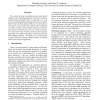Free Online Productivity Tools
i2Speak
i2Symbol
i2OCR
iTex2Img
iWeb2Print
iWeb2Shot
i2Type
iPdf2Split
iPdf2Merge
i2Bopomofo
i2Arabic
i2Style
i2Image
i2PDF
iLatex2Rtf
Sci2ools
RTSS
2007
IEEE
2007
IEEE
Generalized Tardiness Bounds for Global Multiprocessor Scheduling
We consider the issue of deadline tardiness under global multiprocessor scheduling algorithms. We present a general tardiness-bound derivation that is applicable to a wide variety of such algorithms (including some whose tardiness behavior has not been analyzed before). Our derivation is very general: job priorities may change rather arbitrarily at runtime, arbitrary non-preemptive regions are allowed, and capacity restrictions may exist on certain processors. Our results show that, with the exception of static-priority algorithms, most global algorithms considered previously have bounded tardiness. In addition, our results provide a simple means for checking whether tardiness is bounded under newly-developed algorithms.
Applied Computing | Arbitrary Non-preemptive Regions | General Tardiness-bound Derivation | Multiprocessor Scheduling Algorithms | RTSS 2007 |
| Added | 04 Jun 2010 |
| Updated | 04 Jun 2010 |
| Type | Conference |
| Year | 2007 |
| Where | RTSS |
| Authors | Hennadiy Leontyev, James H. Anderson |
Comments (0)

